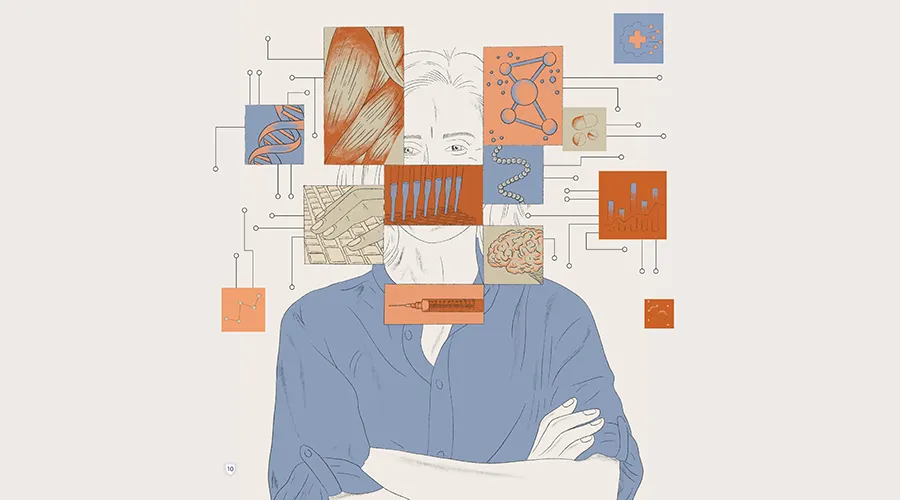At the heart of Penn’s academic community lies the Penn Libraries, where expert staff support research conducted at each of the University’s schools and centers.
With online learning playing a fundamental role in the University’s fall 2020 safety precautions, the Libraries’ emphasis on the Libraries’ strengths in facilitating virtual scholarship—providing remote access to the research, technology, and material collections that fuel Penn’s innovative academic environment—is more vital than ever. In April 2020, the Libraries appointed Brigitte Weinsteiger as Associate Vice Provost for Collections and Scholarly Communication; in this role, she directs the strategy, advancement and growth of the Penn Libraries’ preeminent collections while promoting academic engagement on and off campus. She answered some questions about her role in enhancing the collections and virtual access to scholarly resources, and the philanthropic support that propels these essential initiatives.

 What sets the Penn Libraries’ collections apart from those of other institutions?
What sets the Penn Libraries’ collections apart from those of other institutions?
![]() Our libraries have almost 300 years of history, during which we’ve developed incredibly rich collections that reflected the contemporary research and teaching interests of the University. It’s truly fascinating, what you can find hidden in our collections across our various libraries, archives, and special collections by browsing the stacks or through enriching conversations with our librarians and curators.
Our libraries have almost 300 years of history, during which we’ve developed incredibly rich collections that reflected the contemporary research and teaching interests of the University. It’s truly fascinating, what you can find hidden in our collections across our various libraries, archives, and special collections by browsing the stacks or through enriching conversations with our librarians and curators.
Our collections also support a uniquely diverse set of schools today, ranging in strengths from business to medicine and engineering to social work. It’s impossible to name them all. New research interests and methods have also led to the development of completely new types of collections, from statistical datasets to graphic novels in various languages.

 Digital access to those collections, and to the research experts at the Penn Libraries, is more important now than ever before. How are the Libraries adapting to the increasingly electronic needs of Penn’s students, faculty, and visiting scholars?
Digital access to those collections, and to the research experts at the Penn Libraries, is more important now than ever before. How are the Libraries adapting to the increasingly electronic needs of Penn’s students, faculty, and visiting scholars?
![]() Digital access really is essential today. Though we had certainly experimented with various digital services, our recent shift to a remote work, teaching, and research environment has accelerated those efforts immensely. Our collection emphases have been directed at digital formats, especially e-books and streaming films to support the shift to the virtual classroom that will continue in the fall semester.
Digital access really is essential today. Though we had certainly experimented with various digital services, our recent shift to a remote work, teaching, and research environment has accelerated those efforts immensely. Our collection emphases have been directed at digital formats, especially e-books and streaming films to support the shift to the virtual classroom that will continue in the fall semester.
Simultaneously, our librarians have made the leap to supporting research and pedagogy through completely virtual means. I’m proud to say that we now offer exceptional research and publishing support to our students and scholars through a full suite of remote communication channels, via email, chat, phone, and videoconference, seven days a week and will continue to do so through the fall semester and beyond. We aim to be available to assist any part of the Penn Community’s teaching and research workflow with not only our deep expertise, but ease and convenience.

 What role can philanthropy play in advancing digital scholarship at the Penn Libraries?
What role can philanthropy play in advancing digital scholarship at the Penn Libraries?
![]() Philanthropy is essential to the work we do at the Penn Libraries. Digital collections offer immediacy, greater functionality, and even multiple simultaneous users, but they also often come with a higher price tag than their print counterparts. We also want to experiment with facilitating new modes of research by making available new types of resources, such as datasets, text corpora, and geographic and spatial data.
Philanthropy is essential to the work we do at the Penn Libraries. Digital collections offer immediacy, greater functionality, and even multiple simultaneous users, but they also often come with a higher price tag than their print counterparts. We also want to experiment with facilitating new modes of research by making available new types of resources, such as datasets, text corpora, and geographic and spatial data.
Endowed funds afford us the financial security to build the resources that faculty and students need, and to play a leading role in experimentation and pushing the boundaries of research methods. Perhaps most importantly, however, they ensure that we continue our commitment to collecting and preserving the world’s cultural and scholarly record. Particularly in the current moment, libraries are faced with immense uncertainty about our financial future. I cannot emphasize enough the opportunity that donors have to make a lasting impact here by supporting one of the greatest library collections in North America.
With plans for a “hybrid model” in place for fall 2020, Penn is preparing for an unprecedented shift in how advanced education and research are conducted. As the Penn Libraries and its leaders plan for the new and unexpected challenges that may come, support from members of the Penn community strengthens the pipeline of access to knowledge—and sets the stage for the discoveries of tomorrow.





